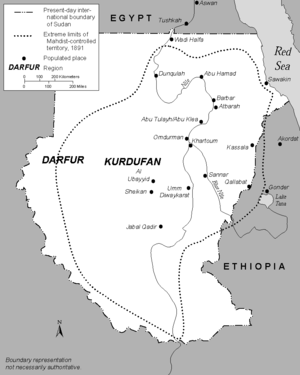Battles of El Teb
| First and Second Battles of El Teb | |||||||
|---|---|---|---|---|---|---|---|
| Part of the Mahdist War, 1881–1899 | |||||||
 Mahdist Sudan |
|||||||
|
|||||||
| Belligerents | |||||||
|
|
|
||||||
| Commanders and leaders | |||||||
| Osman Digna |
Valentine Baker Sir Gerald Graham |
||||||
| Strength | |||||||
|
February 4: 10,000 warriors unknown artillery |
February 4: 4,500 British infantry and cavalry 22 artillery pieces 6 machine guns |
||||||
| Casualties and losses | |||||||
|
February 4: 2,000 killed unknown wounded |
February 4: 30 killed 142 wounded |
||||||
February 4:
1,000 warriors
February 4:
3,500 Egyptian infantry
February 4:
unknown
February 4:
~2,700 killed or captured
The First and Second Battles of El Teb (February 4, 1884 and February 29, 1884) took place during the British Sudan Campaign where a force of Sudanese under Osman Digna won a victory over an 3500 strong Egyptian force under the command of General Valentine Baker which was marching to relieve Tokar on the 4th. A second British force under Sir Gerald Graham arrived on the 29th, engaging and defeating Osman Digna with few casualties.
Britain's involvement in the Sudan was a consequence of its support for the Khedive of Egypt following the repression of Urabi Pasha's revolt in 1882. Despite Egypt still being nominally part of the Ottoman Empire, the Khedive's rule was dependent on direct British support, given to ensure the security of the Suez Canal and the elimination of the Sudanese slave trade.
However, the British government under Prime Minister William Ewart Gladstone sought to stay out of affairs in Egyptian-governed Sudan, that was threatened by an uprising led by the Mahdi, Muhammad Ahmad, who declared a Jihad, against the ‘Turks’, represented by the Egyptian troops. The Mahdist forces enjoyed considerable success against Egyptian troops in 1882 and 1883, and several towns garrisoned by Egyptian troops found themselves surrounded. In their haste to be rid of the Sudanese question, the British urged the Egyptians to evacuate their troops.
...
Wikipedia
